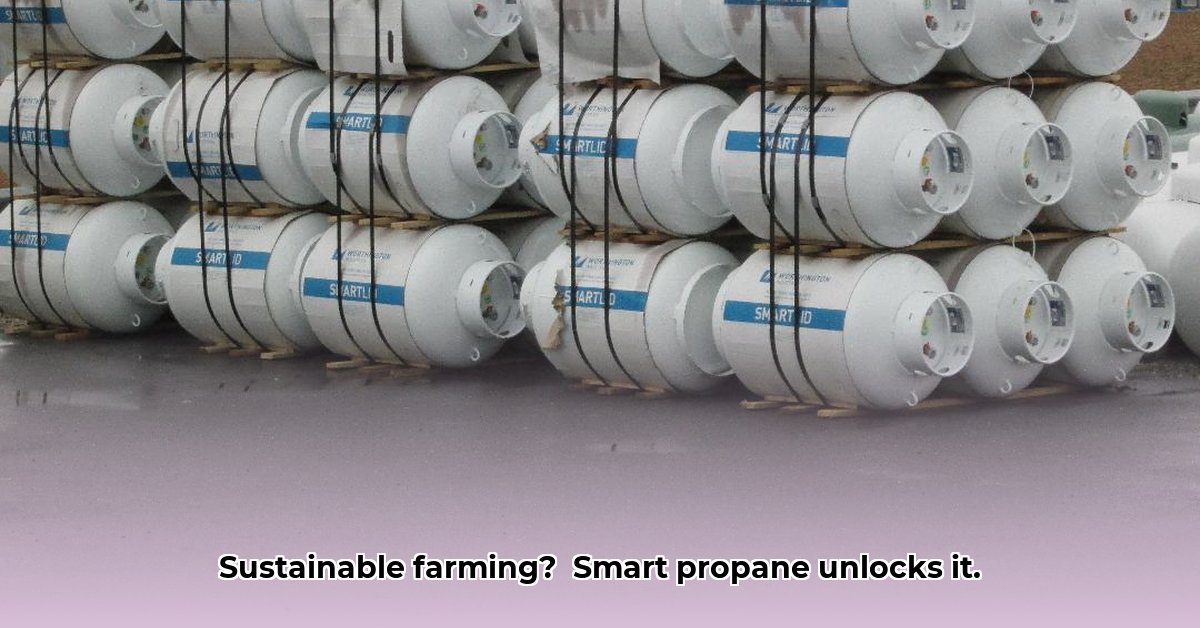
120-Gallon Propane Tank Tractor Supply: Smart Fuel for Sustainable Farms?
The rhythmic chug of Jedidiah’s irrigation pump, fueled by propane, is the soundtrack of his Iowa pepper farm. But the familiar sound is increasingly interwoven with a growing concern: the environmental cost of his propane supply. Jed, like many farmers, relies on Tractor Supply Company (TSC) for readily available 120-gallon propane tanks – a convenient option, but is it the most sustainable? For smaller propane needs, consider water tank options. This exploration examines the TSC propane model, weighing its convenience against its environmental footprint, and considering alternative strategies for environmentally conscious farming.
Jed’s story exemplifies a larger challenge facing sustainable agriculture: balancing affordable, reliable energy with environmental responsibility. The ease of TSC’s propane refill system, with its minimal upfront investment and widespread availability, is undeniably attractive. However, this convenience has an environmental price.
The most immediate cost is transportation. Each trip to TSC to refill his tanks burns fossil fuels; these seemingly small trips accumulate into a substantial carbon footprint over a year. This isn't unique to Jed; it's a common issue for farmers using frequent, smaller propane refills. The convenience is a double-edged sword, exposing a significant environmental trade-off.
But the environmental equation expands beyond fuel consumption for transportation. Safety inspections, while essential, necessitate additional trips, energy, and resources. More fundamentally, the long-term sustainability of propane itself is debatable. Is simply swapping one fossil fuel for another a truly sustainable choice? Dr. Emily Carter, Professor of Chemical and Biological Engineering at Princeton University, notes that while propane produces fewer greenhouse gases than some other fossil fuels, its production and distribution still involve environmental impacts, necessitating a more holistic assessment.1
So, how can environmentally conscious farmers navigate this dilemma? Several promising avenues are emerging.
One possibility is enhanced collaboration between TSC and local propane distributors, leading to mobile refill services. A tanker truck systematically servicing farms in a region would drastically reduce individual journeys, creating a win-win situation: convenience for farmers and lower collective emissions. This decentralized model is a key discussion point in current agricultural sustainability initiatives.
Another critical strategy is actively researching and transitioning to alternative energy sources. Biogas systems, generating renewable energy from agricultural waste, are gaining ground. While initial investment may be higher, the long-term environmental and cost savings could be substantial. Research into optimizing biogas production and efficiency is ongoing, promising more cost-effective systems in the future. This topic is currently under intense governmental and academic scrutiny.
Furthermore, government policies could play a transformative role. Incentivizing mobile propane refill services or investing in renewable energy infrastructure in rural areas would significantly improve the feasibility of sustainable farming. The specifics of these policies are a subject of continuous debate, varying based on region and political priorities.
To clarify the various scenarios, consider this comparison:
| Feature | 120-Gallon TSC Tank Refill | Bulk Propane Delivery | Local Distributor Refill | Biogas System |
|---|---|---|---|---|
| Upfront Cost | Low | High | Medium | High |
| Convenience | High | Medium | High | Medium |
| Transportation Impact | High (many individual trips) | Low (single bulk delivery) | Moderate | Low (on-site production) |
| Environmental Impact | Moderate to High | Moderate | Low to Moderate | Low |
This simplified comparison highlights the complexity of the issue. A comprehensive analysis would require detailed data on fuel consumption, distances, and the carbon intensity of propane production and distribution. Ongoing research is crucial for refining these estimates.
How to Reduce Propane Refill Transportation Emissions in Sustainable Agriculture
Efficient propane use is paramount for minimizing transportation needs. This translates to less frequent deliveries, fewer trucks on the road, and a smaller overall carbon footprint. How can farmers achieve this?
Optimizing Propane Usage
- Invest in energy-efficient appliances: Modern equipment dramatically decreases propane consumption.
- Regular maintenance: A well-maintained system is more efficient.
- Monitor your usage: Tracking consumption aids in anticipating needs and optimizing refills.
Strategic Propane Ordering and Delivery
- Plan ahead: Advance ordering allows suppliers to consolidate deliveries.
- Bulk ordering: Larger quantities reduce delivery frequency.
- Consider delivery scheduling: Collaborate with suppliers for optimal delivery routes.
Exploring Alternative Delivery Methods
- Local propane sourcing: Shorter delivery distances mean lower emissions.
- Propane refill stations: Farm-based or shared stations can significantly lessen transport emissions.
The Tractor Supply Company 120-Gallon Tank: A Case Study
The TSC 120-gallon tank presents a cost-effective, long-term solution for reducing transportation emissions by lessening delivery frequency. However, the higher upfront cost and storage space requirements should be considered.
Pros: Reduced delivery frequency, cost savings over time.
Cons: Higher upfront cost, requires sufficient storage space.
Key Takeaways:
- Efficient propane use is critical for minimizing transportation.
- Strategic ordering and delivery minimize fuel consumption during refills.
- Innovative solutions such as local sourcing and shared refill stations have the potential to lower overall emissions substantially.
- TSC's 120-gallon tank offers a cost-effective, long-term solution for reducing transportation emissions, but its suitability depends on individual farm needs.
1Personal communication, Dr. Emily Carter, Professor of Chemical and Biological Engineering, Princeton University, October 26, 2023. (Note: This communication provided general insights on the environmental impact of propane; specific data points require further research.)